#because narratively its very interesting scene because i changes the tone of their relationship in comparison to the rest of the show reall
Text
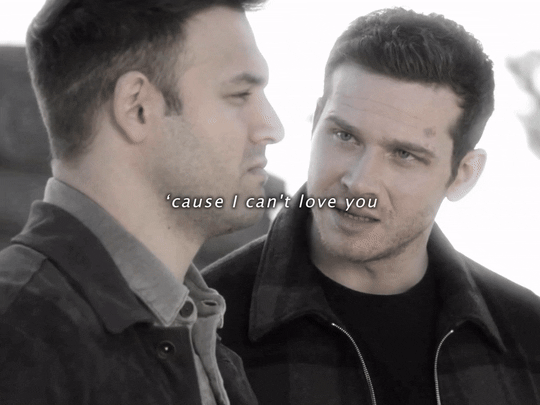
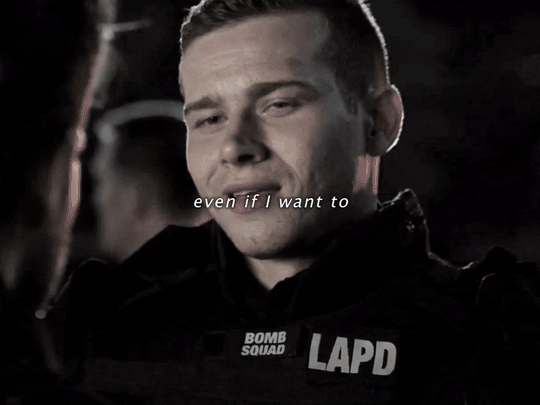
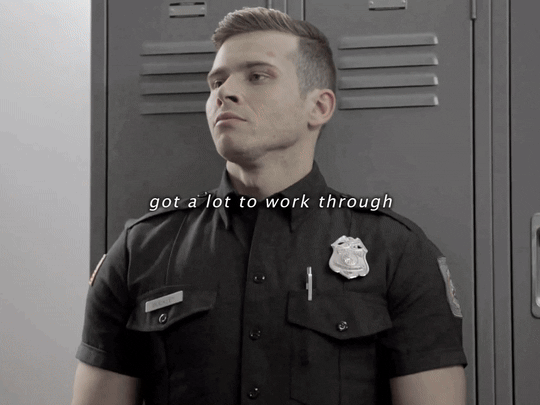
Fought 'til you tethered me, swept under surfaces, never enough of it...
#911#buddie#911edit#buddieedit#911 on fox#911 fox#911 abc#evanbuckleyedit#eddiediazedit#my edit#otp: you don't need to pretend with me#usercam#at this point i should have a cemetery tag lol#flashing tw#i need a gracie tag dont I?#die on their watch.#so i was thinking earlier and if youve been around here any length of time you know i think about that cemetery scene a lot#because narratively its very interesting scene because i changes the tone of their relationship in comparison to the rest of the show reall#and its a fascinating choice. even the whole point that of the conversation happening at a cemetery where theyre visiting someone who didn'#but i have a tendency to look at that scene from eddies eyes#because when you look at it along with all of eddies reactions surrounding bucks death and the reactions eddie was having to bucks words#that feels like a breakup. if feels like were watching eddies heart break in real time yk?#BUT buck is very purposeful in this scene too. he's basically daring eddie to say something but eddie just thinks that he needs to agree#and if you look at it that way and think about it as buck asking for a reaction you can argue buck feels rejected here too#even tho eddie thinks hes being supportive#they are saying things and they are being misinterpreted. both of them leave that talk with different views of what happened#and thats VERY interesting with how strongly the show pushed buck eddie and chris as a family unity in the episodes before#and well i dont really know how the show plans to recover from that. if they plan on doing it at all. but like#that was a breakup. but if its a breakup where both of them think they got broken up with. how do you come back?#eddie diaz
102 notes
·
View notes
Text
For those of you who've been following me for a while now, there's a good chance you got to experience my journey reading the Remembrance of Earth's Past series last year. I loved Three-Body Problem, but The Dark Forest and Death's End were like pulling teeth. Both books had their very very good moments, but getting through them was a tedious experience I considered giving up on on multiple occasions. I will give it to Cixin Liu tho, I needed to know how the series ended and that alone was the sole reason I pushed towards the finish line. Any author that can make me tough out bad writing for the sake of seeing the end deserves some kind of award (and he won a ton anyway, so).
I approached the Netflix series with zero expectations given their propensity for shitty adaptations (One Piece notwithstanding), but after watching the first episode I was left cautiously optimistic.
Having watched all 8 episode I'm still unsure how to feel about it. I spent most of the series hitting pause to rant at my roommate about it, both positively and negatively.
I had many issues with the books, but some of the more obvious ones came from a writing standpoint. I love hard sci-fi. I could not excuse the sheer length of those final two books. The atrocious treatment of women as objects to romance and use as bartering for the main character. The abysmal MCs (specifically Luo Ji) that made me want to yell to the high heavens due to annoying they were. The lack of human connection between characters.
For books so steeped in sociopolitical and ethical commentaries, the flagrant misogyny and homophobia was eye-rolling. And not even in a "This is Bad" sort of way, just in a "This is So Fucking Boring" kind of way. I cannot speak for the author's biases, because the contents of a book in no way reflects the views of an author or their character.
Where the books shone the brightest were during the battle scenes, the looming dread, genuinely horrific thought experiments.
And, surprisingly? It feels like the people at Netflix thought the same.
I've never watched Game of Thrones but I understood why people were against it from the get-go. That, along with the whole "whitewashing" thing which I consider to be interesting. For starters, you're using whitewashed wrong. Yes, they moved the central story from China to England which was... a fascinating choice, but of the core five (that quickly became the core four), only two of them are white. I'm not saying it was okay for a western adaptation to take a cast and further diversify it, I'm just saying that that's not whitewashing.
That aside, I did like some of the choices that were made from a narrative standpoint. Reshuffling and streamlining events, for one. Removing the whole plot line about Luo Ji hunting down a woman who he invented in his head in order to marry her? I'm not entirely sold on the idea of taking core events and divvying them up between four different people, but I do understand what they're trying to do.
The book series failed at crafting believable and impactful relationships between its human characters, which made the narrative feel hollow and one-dimensional. This adaptation aimed to change this by slapping a band-aid over the issue. Like I said, I'm still unsure of how I feel about this.
A lot of unnecessary stuffing was removed to make a suitable run time, and I say unnecessary because there's really no scenes that are making me go "oh, I wish this had been included". Was some stuff rushed? Yes. The passage of time could have been outlined a little better, but that's a small nitpick on my end.
The scale of things was toned down, and I don't think Netflix has the capability (or budget) to tackle space battles.
Honestly? I don't really see this getting a second season for a variety of reasons, and I'd be okay with that.
It was an "okay" watch, in the end.
Tho, I'm still flabbergasted by the random "gory scary jumpscare" scenes????? Where did those come from??? I don't remember anything like that being in the books but, you know. I've read a lot more books since finishing these, so.
#texts.#watch tag#3BP spoilers#3 body problem#spoilers#i needed to talk about it or else i'm going to explode.#miller writes#i guess? since this is kind of an unofficial review
10 notes
·
View notes
Text
Beyond Evil: the Romantic Rain trope
Hello! Guess who's back on their shit again... Me!
When I first finished watching Beyond Evil/ 괴물 on 5/02/22 (yes, I know, it surprised me too during the last episode), I immediately started writing an essay about the show's queer subtext/queer coding. The essay is an analysis of episodes 1-8... and it's ridiculously long and unfinished (and probably never will be finished).
This post includes the opening parts. I like them, so I have decided to share them. These opening thoughts surround the rain scene in episode two and how it is romantic in tone.
[I do have another bit analysing Dong Sik's queer coding, which I might post one day.]
So, yeah, this is a part of a larger piece. So, that's why it feels a bit incomplete.
A disclaimer:
~ I use the word ‘queer’, a lot. But this is not meant as a derogatory/offensive term. But instead, is used by its reclaimed meaning: a generalised term to refer to someone who isn’t heterosexual.Also, all spellings of characters’ names are taken from AsianWiki.
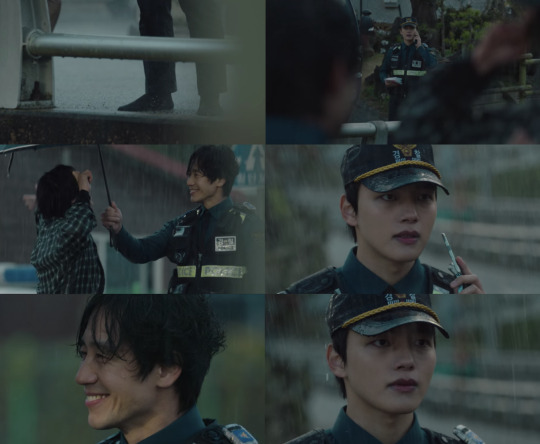
(my very gloomy-looking screenshots)
Enjoy!
“Why are you doing this to me? Why?” Han Joo Won talking to Lee Dong Sik (episode 5).
Have you ever asked someone a question that they refuse to answer? Instead of giving you the information you want, they dance around it, jump to conclusions, and add the right amount of distraction; until you can’t even remember what you asked in the first place. This is a recurrence of Beyond Evil’s main characters Lee Dong Sik and Han Joo Won. Their conversations and arguments often spark one of them to ask a question that the other does not answer.
This happens numerous times throughout the first half of the series. Typically, these questions are of the following nature:
“Just what about me interests you so much?” Lee Dong Sik, episode 2
“It’s a dangerous thing to become attached to someone. Don’t you think?” Lee Dong Sik, episode 4
“Why can’t you leave me alone?” Lee Dong Sik, episode 5
(English translations taken from Netflix)
Oftentimes these questions are more for the audience to ponder on, rather than for the characters to outright answer. This is why they aren’t answered with verbal confirmation but instead, with the character’s actions.
In the thriller, crime, and mystery genres, it is usual to have a protagonist investigate and chase our anti-hero/sympathetic villain. Beyond Evil (otherwise known as Monster/ 괴물) uses this narrative trope as the basis of its storytelling: one hotshot young guy comes from the big city to investigate an older seemingly unhinged man of a crime he may or may not have committed. But over time, as the protagonist learns more, we get to see the shades of ambiguity that are bursting at the seams. Furthermore, both characters will be forever changed because of their relationship and the events that follow.
One element that makes Beyond Evil stand out from others within the same genre is that this story isn’t really about a small hometown murder. It uses the murders within this rural area as a canvas in which to tell the real story: love. One way this is proven is that the story focuses on the victims and their friends and families, and the overall community, instead of the killer(s).
Beyond Evil explores and showcases the Ancient Greeks’ philosophy of the seven kinds of love:
Eros: romantic love; passionate, lustful, the want for sexual intimacy
Philia: friendship; affectionate, platonic, sweet and equal
Storge: familial; strong bonds, kin-ship, unconditional
Agape: altruism; empathy, selflessness, love for worldly experiences
Ludus: new love; non-committal, flirtatious, playful
Pragma: committed love; long-term relationships, companionship, maturity
Philautia: self-love; self-esteem, self-worth, a necessity
(information source: https://www.wellandgood.com/greek-words-for-love/)
It is a story highlighting the importance of love: all the different kinds of love we encounter in our lives; how we are affected by them; what it looks like to live without love; including, when it's time to accept love and when it's time to let it go. But most importantly, sometimes, you can find love in the most unexpected place.
[But before we get ahead of ourselves, let’s sprinkle some background information and analyse the first half (the first act, if you will) of Beyond Evil (episodes 1-8) and look at how Joo Won ended up broken-hearted in Dong Sik’s front garden.] Redacted for this post.
ii
On the first watch-through of this show, the audience is told the story predominantly through Joo Won’s gaze; which is biassed and trifled with unreliable narration. Through his perspective, we are toyed with and encouraged to constantly doubt the other characters. The show expertly uses Alfred Hitchcock’s film theory Pure Cinematics for instilling doubt, harnessing the power of the editing process to define the visual narrative. In other words, the show creators displayed a key understanding of how the narrative changes with context.
The best example of this is the butcher shop sequence on the night of Kang Min Jeong's disappearance. We are first introduced to the sequence from Joo Won’s perspective: all of Dong Sik’s actions are awkward and suspicious, and we over-analyse his movements and actions/inactions to come to the conclusion that he’s done something. Then later on in the show, we revisit this sequence from Dong Sik’s perspective and yes, he has done something but not what we were led to believe. All of his awkward and suspicious behaviour becomes a painful and morally grey experience, where the audience feels great sympathy for him.
The context defines the narrative. Without the full context, we do not get the full story.
And only with the full context, can we look past the structure of the piece and unveil the answers to the questions that are asked... we reveal the truth.
Whilst rewatching the show, the viewing experience is completely different. All the pieces are already fitted into place, so I spent less time trying to decipher and instead, leisurely trying to digest. The experience is nowhere near as suspenseful but far more gut-wrenching. This is because the viewer already has the full story - the full context - everyone’s actions and inactions are accounted for: we know why x was acting sketchy in episode y because of what they did 20 years ago, and so on.
When everyone’s actions are accounted for it is a lot easier to follow the story from Dong Sik’s perspective. We see the injustices that innocent people go through more harshly, we also see the cruelty of the guilty from the get-go. We are able to focus on the smaller details of people’s relationships, instead of thinking about the big picture. We are also able to take the time to truly understand the visual language the creators are showing us and how that shapes the narrative.
There is one sequence that comes to mind that is told purely from Joo Won’s perspective. There is no dialogue during this particular sequence of shots, so the audience is completely reliant on the visual language to understand what is being conveyed. This scene is greatly important for the show as a whole, as it gives us an uncensored look into Joo Won’s thoughts. Without it, the narrative of the story would be different, as it adds context to Joo Won’s actions later on in the series. That scene is from episode two.
iii
Joo Won and Dong Sik are on patrol, still getting used to each other as partners. One) because their personalities clash and two) because Joo Won is actively investigating Dong Sik for murder, which is just hanging there between them. They stop their patrol to help a disabled young adult who is lost in the rain. Dong Sik takes charge of the situation because he is better equipped at interacting with disabled people and the people of Manyang (and the wider Munju area) as a whole. This scene is one of the most important as it is an untainted humanisation of Dong Sik’s character, giving the audience (and Joo Won) a first glimpse into who Dong Sik really is.
Up until this point, Joo Won has only seen Dong Sik as a character: the killer; “the suspect” as Dong Sik later describes it. He vehemently dislikes him but still has a misguided interest in Dong Sik’s life. But this suddenly is challenged. Standing there in the rain, with no shoes on, smiling at the young man who is dancing, we get to see what Joo Won sees for the first time: kindness, humility, and beauty.
It’s a glitch in the system.
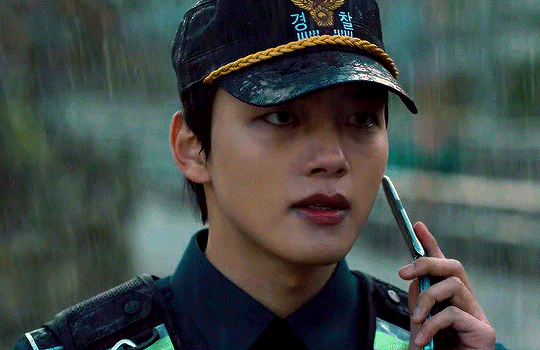
This scene is slightly baffling. It poses the question of what the creators are truly trying to tell its audience. Is it that these two characters work best when they are unified and Joo Won’s assumptions of Dong Sik are wrong?... Well, yes ... but also, of course, hiding in plain sight is the subtext that Joo Won is gay/queer.
Which point takes paramount importance? It would seem that in this scene it’s the subtext. We see why this is so through the sequence of shots:
After the situation has been assessed by the pair and they have come to an agreement. Joo Won goes to the shop to get supplies to help with the young man and when he returns, we, the audience, are faced with a sequence of ever-closing in close-up shots.
With each cut, the camera is showing us what Joo Won is choosing to focus on; where his eyes are gravitating. What is odd about the sequence is the information that is chosen to be shared: Dong Sik's feet, the umbrella, the smile: kindness, humility, beauty.
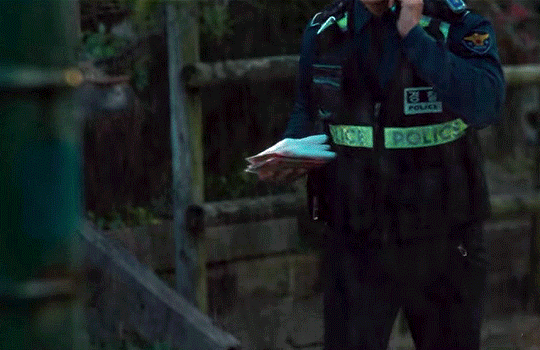
Joo Won returns to the pair and falters, he seems shocked into stillness. Which almost seems frivolous, as Joo Won is already privy to two-thirds of the information being presented.
Joo Won already knew that Dong Sik had given his shoes to the young man.
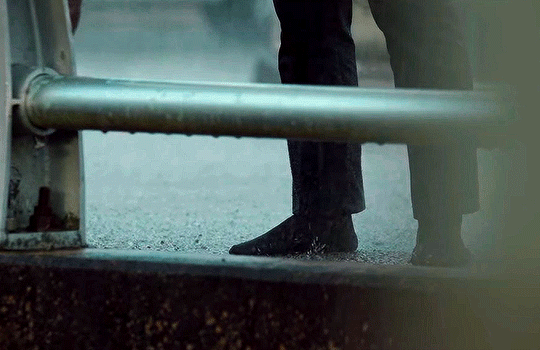
He knew about the umbrella because he is the one who gave it to Dong Sik to use.
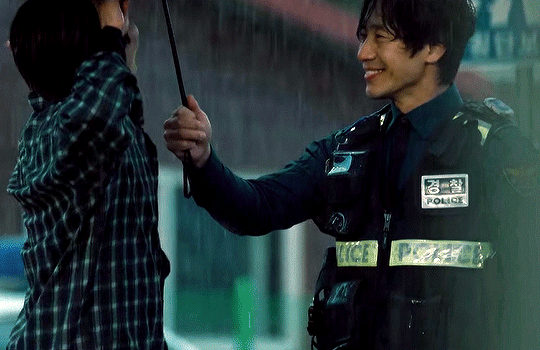
Then… they cut to a slow-motion close-up of Dong Sik’s smiling face, rain behind him and sunshine kissing his face. This last shot is the only piece of information we didn’t have before Joo Won went to the shop because it’s Joo Won’s thoughts at that moment. It’s no longer information that can be detailed in a police report but a deeply human moment. He has digested the information in front of him and this is his conclusion: beauty.

This screams romantic undertones- especially with the knowledge that rain is often used as a romantic trope in visual media.
“Rain seems to go along with pivotal moments in characters' lives. It's implied that if you can ignore bad weather and brave the elements, then your big moment is even more real and intense and genuine. If you want to be deserving of your love, you won't care if it's raining, you will rush out into the rain to be with her or him-” tvtopes.org, Romantic Rain.
This trope is used often within Korean media, especially within the romance genres. So, it is a visual language that is common knowledge with Korean audiences. It is less likely to be seen within the crime and mystery genres, so it speaks volumes that the creators decided to include it.
Here are three examples of Korean dramas that use the Romantic Rain trope to show the protagonists have romantic feelings for one another:
Legend of the Blue Sea: offering an umbrella as protection/taking someone into your care
Flower of Evil: Hee Sung allows himself to become soaked because of his feelings
Goblin: slow motion shot of the characters passing one another in the rain
How Beyond Evil uses the same visuals within this scene:
Protection: Joo Won gives Dong Sik an umbrella and forensic shoe covers
Soaked: Joo Won stops mid-run to stare at Dong Sik in the rain, seemingly awestruck/concerned
Slow-motion: Joo Won’s perspective in the following sequence of close-ups is in slow motion
This scene is not the moment that Joo Won realises the extent of his feelings for Dong Sik. It is used as supporting evidence for the later conversations Joo Won has with Park Jung Je and Nam Sang Bae. In which he is asked by both of them why he cares so much about the cold case (in which Dong Sik is his suspect). To which, Joo Won replies the first time he’s asked:
“This is Lee Dong Sik’s–”
He shouts this and has to stop himself, calming down to answer that he’s determined to solve the cold case because one of the victims is Lee Dong Sik’s sister. The key person in that answer is Lee Dong Sik. He is the reason Han Joo Won cares so deeply [and because of his own personal involvement] about a case that no police officer would try to solve:
“-there isn’t a single cop in the country that would prioritise such a case.” [Park Jung-Je.]
Han Joo Won is a determined person. When he sets his mind to something, he will achieve it, even if it upsets other people or hurts himself. He’s a person who cares deeply about things and can become easily fixated. If the creators wanted us to see Joo Won’s actions deriving from a place of spite or a self-righteous need for the truth, they would never have used the Romantic Rain trope.
Following the scene in the rain, Joo Won chooses to not act upon what he felt then and instead, suppresses his feelings. It makes sense. He’s experiencing attraction (eros) for his murder suspect; the man that he has been obsessing over; the man who only now is more than just a character to him. He is becoming a human and a very attractive one, at that.
Joo Won doesn’t know what to do with that newfound knowledge. So… he starts to lose his cool. This is obviously aided by other factors…
Without this scene, and those particular shots, Joo Won’s intense interest in Dong Sik and his mental decline over the next two episodes wouldn’t make as much sense.
When we take the queer subtext into consideration, it makes the puzzle pieces fit all that bit more snuggly. It gives us the knowledge that Joo Won has humanised Dong Sik in his mind, he likes what he sees and he doesn’t know how that fits around his rigid moral compass… and what Joo Won knows about himself because really this scene is more about Joo Won discovering himself than it is about Joo Won discovering Dong Sik.

---
Look how devastated he is. This man has literally stalked the very handsome man he's staring at, has taken pictures of him, has said pictures on his tablet/printed out, spends his days staring at these pictures whilst biting his lip- then gets all bent out of shape because he realises he's attracted to him?? Baffling.
That is it for that scene's analysis, I remember writing more but I must have deleted it at some point. Anyway, hope that was entertaining and easy to read (I have the tendency to ramble on/make grammatical errors haha).
See ya!
#beyond evil#jtbc beyond evil#han juwon#han joo won#lee dongsik#jwds#sir is it gay to use romantic tropes#whilst staring at your murder suspect??#look how beautiful jw thinks ds is!#my guy is doomed#beyond evil analysis
180 notes
·
View notes
Text
A Sea of Monsters Retrospective, 16 Years Later
You can read my Lightning Thief retrospective here.
To anyone who says these are children’s books and not for all ages – Around ten years ago, I was waiting outside a baseball stadium for the doors to open with a hundred other people dying in the heat and this 50-something dude was propped under a palm tree with this book in his hands, happy as a clam.
If I ran a more popular blog, I’d make a poll asking the favorite book of the original five. And I can say with confidence that Sea of Monsters would not win. It’s a good book! It gambles with interesting new elements and directions it takes its characters, it’s funny, it’s full of shiny new locations. It’s, I think, the least-best of a very impressive series, solely because the other four are that good.
With that said, that has been my opinion for sixteen years. Did it change upon this latest reread? **Spoiler alert**
The Sea of Monsters
If you’re keeping up with the classic myths homages, SoM is probably the most obvious one – the Odyssey/Jason and the Argonauts. TLT did steal the land of the lotus eaters, but they outright say ‘hey, this is what Odyseus and Jason did’.
We cold open on one of Percy’s nightmares and in seven pages (in the ‘06 paperback) plot, exposition, and tone have all been established: Grover is in Florida and is being chased by a huge monster. Camp is in danger, Percy’s not supposed to know about it, and he’s pissed. Tyson, a new character, is going to be important. And, we get all caught up with a quick refresher on the need-to-knows from TLT. Percy’s still young enough to doubt his instincts (lolz) about something spying on him and man, I forgot how innocent he used to be.
The action continues with the Laistrygonian fight and all these puzzling details surrounding Tyson. As with TLT, PJO isn’t much for long paragraphs of poetic narrative, which means it’s paced incredibly fast and it doesn’t slow down at all during the taxi ride to camp, and then straight into fighting the golden bulls.
Compared to TLT, SoM spends exactly as much time as it needs to in the mortal world and at camp without first-book exposition dragging it down. Before, they didn’t get their quest and leave camp until almost halfway through the story. This time, it’s about 1/3rd and all the better for it.
The tone of this book is refreshingly different as well. This time, there’s trouble in paradise and everyone’s upset. Percy isn’t supposed to be the hero, he’s just a camper told very firmly to stay out of it. He’s not the one given the quest, he’s not at the crux of the prophecy, and he’s not the most important camper – and this bothers the heck out of him.
The stakes aren’t higher, per say, the fate of the world doesn’t hang in the balance this time, but they are more personal, and that makes the risk of failure that much more plausible. It’s not a godly civil war, it’s their home, it’s Chiron, it’s all their friends and the only sanctuary they have, and it’s Thalia’s legacy.
Exposition is handled as well as it was in book one. Percy is still the audience’s eyes and thus the audience’s mouth to ask all the expository questions, but, since it’s usually Annabeth having quite the attitude explaining things, it also builds on their relationship. One scene that comes to mind is discussing Jason and the Argonauts in the dish pit and their back-and-forth was hilarious.
Also, of course, I have to address the rather bold directions his character went – Percy has some scuffy new flaws. He resents Tyson as his brother and Poseidon for claiming him and makes some pretty crummy choices surrounding their relationship for the sake of not being bullied again by the entire camp, and not being known as the “kid with the cyclops for a brother”. He grows from this throughout the book, once he thinks Tyson is dead he regrets everything, but he’s a little jerk there for a while and I appreciate that he’s not perfect.
He’s also troubled by his physical appearance on Circe’s island, as any teenager mid-puberty is, and it doesn’t end with “you’re beautiful no matter what” or really any moral to take away. He’s just. Self-conscious. That’s it.
**Side note, before the new character art by Viria was accepted as canon making these characters much more conventionally attractive, the original art (especially poor Nico) did not try to make them all flawless and people poked fun, but there’s still a place for it. **
Now, Clarisse. I mentioned in my last retrospective that Ares was the bully house filled with bullies, but she got so much depth and development in this book, worlds beyond just being the jealous, snot-nosed brat. She’s smart, she’s cunning, she cares about her subordinates in battle, she’s got insecurities and a temper and friends who don’t really stick up for her (re: the You moo, girl! sign). She, too, has an absentee parent just like every other camper around her. She, too, is just a kid. And she, unlike Percy, has a huge jerk for a godly parent, and not one she can petrify with Medusa’s head.
Other beloved characters make their first appearances this book – Silena, Beckendorf, the Stolls, Chris Rodruiguez. I’d forgotten that they didn’t just show up in Battle of the Labyrinth, they’d been there the whole time.
The side-villains/monsters of the book are so colorful and unique. Circe’s island, the dead Confederates, the enchanted cruise ship. Even when they’re squatting in the cabin or stranded in the lifeboat, the conversations make it interesting where the setting comes up short – those two scenes are dedicated entirely to character drama, not plot.
Also Blackbeard was a son of Ares and Percy commandeers the Queen Anne’s Revenge, ha! I’d forgotten about that. I didn’t forget the Sirens and wow, kudos for intensity. The scene does so many things at once – plunge the tone down to the bottom of the Sea of Monsters, reveal Annabeth’s fatal flaw – hubris – and gives us some sweet, sweet percabeth all in incredibly dramatic fashion.
**Side note, I can’t remember for sure if Annabeth calls him Seaweed Brain first in TLT, but I think that nickname honor goes to Thalia in one of the dream sequences in this book.**
SoM doesn’t suffer the curse of the sequel. It doesn’t just reskin the previous book with the exact same premise: Prevent a godly civil war, go on this fetch quest across the country (there is a fetch quest but it’s different this time), the mood at camp is completely different, Chiron isn’t there, Tantalus is ass – it’s new.
It also gives plenty of new lore and backstory on Luke and Annabeth’s past that matters to the plot at large.
Speaking of lore, the gimmick of convenient dream exposition really finds its footing in SoM. No crucial information is ever handed to the characters on a silver platter and it never feels like a crutch to move the plot along where the story would otherwise be stuck, but they certainly do happen at convenient times. It is also the first and, I believe, last? time we get the empathy link thing with Grover, and the last mention of satyrs being empathic.
Unlike a certain other fantasy series, the plot holes in this series are less canon-shattering and more “huh, I wonder what happened to that,” and this empathy link is one of them. I don’t know what happened, if Riordan just didn’t like it after this book, but it seems like a useful power given how central a character Grover is for most of the series. We get one good use of Grover’s empathy in TLT when they’re lost in the forest and he tells Percy exactly what he’s feeling, and we get plenty of dream sequences with the link this series and then… never again.
It’s a shame. They were interesting concepts.
Monster Donuts as well never appear again and Ares’ curse specifically said “every time” Percy raises his sword, not the one time he needs it most. Enforcing said curse in every single one of Percy’s battles would be tedious, but in the climax of the Polyphemus fight, Annabeth’s down, they’re all exhausted and out of options, that would have been a fantastic time to mention it.
It’s a shame. They were interesting concepts.
Something I didn’t touch on much for TLT that I will do now is the villain’ plan.
Step 1: Poison Thalia’s tree
Step 2: Get Chiron to take the blame and leave
Step 3: Wait around hoping the camp figures out they need the Golden Fleece
Step 4: Since we don’t know where it is/can’t be bothered to get it ourselves, we’ll steal it from the heroes once they’ve done the hard work
Step 5: Possibly raise Kronos but more importantly, raise Thalia
Also, somewhere along the way, free Tantalus from the Fields of Asphodel and give him Chiron’s job. Who’s idea was that? Not even Dionysus likes him after the Stymphalian birds attack. Why is he still here?
It’s a good, non-convoluted plan for a kids’ book. Luke definitely spouts some mustache-twirling propaganda that would be cheesy if you didn’t realize he’s being groomed (and most kids reading this wouldn’t) but looking back… damn, that is tragic. He was just an angry kid.
His dialogue reads a bit corny now. Luke’s only excuse for falling victim to the classic “I won’t be efficient and kill these interlopers myself, no I’ll turn my back and leave it to the minions” trope is that he needs them alive to do his dirty work and think they escape of their own volition. Percy’s solution to the camp problem at the end is clever and works solely because Luke is such an arrogant prick.
Now, the prophecy, one we don’t hear for most of the book because it’s not Percy’s:
You shall sail the iron ship with warriors of bone,
You shall find what you seek and make it your own,
But despair for your life entombed within stone,
And fail without friends, to fly home alone.
Since it wasn’t Percy’s prophecy he and the audience would spend the quest trying to decipher, it doesn’t need to be all cryptic, and it’s not. Unfortunately, it doesn’t show up until chapter 17/20 so by that point it just kind of… exists, giving Percy and co the idea to get Clarisse on a plane. This detail, the emergency flight, is the only reused plot thread from TLT, I think.
Concerning the ending: I also forgot about the raid by the Party Ponies! I can’t gauge how easy it would have been for younger me to predict Thalia’s Fleece-granted revival, but reading again — her showing up in the dream, the reminders that Percy is the only eligible prophecy kid on technicality because of what happened to her, it wasn’t obvious, but it was well seeded through the book.
**Side side note, the font is a bit difficult to make out, but I’m pretty sure the address to Camp is Pi. Farm Road 3.141. Also, headcannon, but I think the unnamed first year Apollo Cabin chariot driver in the redo race is Will Solace.**
And, though it’s not revealed that Thalia is older than Percy by a couple months in SoM, this mysterious Great Prophecy we’ve been hearing whispers about suddenly gets flipped on its head. Now, Thalia’s back. Now, Percy can’t be the prophecy kid unless she dies again. Now… Now what?
In the words of Poseidon: Brace yourself.
I think the only negatives are again, the established empathy rules with Grover that don’t matter after this book (which isn’t really this book’s fault) and the reminders that they’re all technically related? Luke, aboard the Princess Andromeda, greets Percy and Annabeth as his favorite cousins and it’s… kind of weird knowing that Annabeth has a crush on him. They establish later that, outside of same-cabin-coupling, the gods don’t have DNA so it doesn’t really count, but still. The reminders are a bit squicky, and that’s ignoring the age gap between “college age” Luke and 13 year old Annabeth, per Percy’s description.
—
To answer my own question at the start of this: I think I have to move Sea of Monsters up a slot in my ranking and unseat Titan’s Curse (which I believe was the trend years ago, for reasons I’ll save until that retrospective). It was so fun to reread and such a different adventure to the Lightning Thief without any first-book worldbuilding baggage.
3 notes
·
View notes
Note
hey there! i love your analysis on why you think mike is already aware of his feelings. but my question is, wouldn't it also make sense for him to be behaving weirdly and doing all of that even if he's already gathered that there's something off about his relationship with el and his feelings towards will even if he doesn't know that his feelings for will are romantic? what makes you 100% sure that he's fully aware of how he feels?
yes it does make sense that he’d act weird just because he knows something is off and i think a perfect example of that is “its not my fault you dont like girls”. i dont think he was questioning his sexuality or wills sexuality at this point but he does have the idea ingrained in his head that he SHOULD have a girlfriend and not showing interest in girls at their age is bad.
there are other odd behavioral things he does in s3 but theyre different than s4. i think of s3 as the anti-mlvn season and s4 as the pro-byler season. in s3 we see some actions that can tell us that he may not be romantically interested in el but we see almost nothing in that season (behavioral wise) that tells us he is interested in will. that changes dramatically in s4. almost all of his questionable behavior in s4 is towards will and the odd behavior towards el is just a continuation of how he acted in s3 but with a much more serious tone. (im not including 1 or 2 bc i dont think any part of him was questioning his sexuality or feeling like something was off then).
in s3 most his odd behaviors are towards el. and theyre little things.
in the very beginning he doesnt let el touch him while shes kissing him.
when hes biking back el looks so happy talking to him on the walkie and mike just has this weird concentrated look on his face.
when she breaks up with him he looks like this is just an inconvenience to him, not like hes genuinely hurt.
theres also a big difference in how these odd behaviors are shown in s3 than s4. s3 usually shows it in a light, comedic way. like the first time he struggles to say he loves el to her face when hes cleaning her wound. this scene is portrayed as comedic and lighthearted. just your normal awkward teenager nervous to tell his first girlfriend that he loves her, makes sense. but then they continued that narrative in s4 and showed that it was actually a real issue in their relationship. i think that means that mike is in a much darker place because he knows how he really feels but isnt telling her the truth.
they do this again with the last kiss scene in s3. he doesnt kiss her back at all and looks completely baffled after she says he loves him. again, could easily just be an awkward teenager moment, but they made the tone much more serious in s4.
and then theres all the new questionable behavior towards will specifically that we’ve never seen before. not calling will but writing to el all the time, looking visibly nervous talking to him (airport scene, ‘cool cool’ scene), insisting that el is his girlfriend and theyre just friends. theyre not vague oddities anymore, they revolve around will.
we have seen mike stand up to homophobic bullies badmouthing will, stay with him 24/7 when he was in danger, hold his hand when he was shaking, tell him that asking to be his friend was the best thing hes ever done, and now hes scared to just hug him. he knows how he feels about him.
all that being said, i do think hes suppressed this knowledge a lot and is still in denial and trying so hard to hold onto his precious heterosexual relationship but he knows his true feelings. and i think he feels terrible for staying with el knowing this but if he did break up with el it would be like admitting/accepting that he really is queer which he does not want to do. (which is why hes the perfect victim for vecna)
18 notes
·
View notes
Note
did you write that kohlinar thing yourself??
corrupted by the color of passion has me rending my clothes like in biblical times i'm
the whole thing is painfully beautiful, of course, but that phrase in particular just stabbed me right im the heart
Yes: I did an audition tape for something, and these days on film I recognize the subtle ‘kirkisms’ so I sometimes pull out little clips/stills and play with them. The gif-maker was corrupting but it suddenly gave me the idea of Spock having taken one tape of Kirk with him and it getting damaged somehow, and him reflecting on what he was doing.
If you watch The Motion Picture, there's a key difference, in my view, between the series and then, and it's (as others have referred to) the knowledge of what they are to each other. There's a whole new intensity to it, and the tension is mesmerizing. The idea of Spock purging all his emotions seems absolutely connected to Kirk (especially if you read Gene’s novelization). The most interesting untold Trek story is that one. That story has never been, to my knowledge, explored in the way the source material cries out for, in canon or 'legends' (Trek books/comics), though fanfic has surely ventured into the ballpark. The Motion Picture was what kicked me off in Trek proper, and after watching Wrath I went back to the beginning. Glad I did, because by the time I got to #3, where Kirk lies, cheats, steals, sacrifices his career for Spock, who is more important than anything, as though he were a part of him, I had the requisite grasp of the character arc and that relationship to fully appreciate it.
Acting is a strange alchemy and sometimes you find people who play magically well off each other. As an actor I’d liken running a scene to a moment of dreaming, the kind of dream where you’re not really yourself, and is surprisingly slippery when you step out of it. It’s odd watching playback and seeing things you weren’t conscious of at the time. I only mention it as people speculate a lot about how Kirk and Spock were created, and that amazing relationship. It’s littered with moments that really strike me as this kind of spontaneous ‘chemistry’, and yet there’s also the sense it wasn’t all left to chance. I refer mainly to the aspect that goes beyond a bounded notion of friendship; as others point out, there’s a terrific amount in the writing, editing, the photography – all these things are storyteller’s tools on film – that feed into it. Whatever the case, what’s there is there. It’s not hard to understand why the specificity of these characters, and their relationship, is important to fans, and re-interpretations don’t always land.
I have various friends in the industry and in fandom who articulate similarly, but I could talk forever about the original series and movies. I could walk you through Where No Man Has Gone Before, where immediately you have not only physical synchronicity, but a subplot that lays down the keystone and tone of their relationship: if it wasn’t at that point the intent of the writing, it’s in what the actors were doing innately. And I would say this is a salient point: you have scripted lines that have little to them, but are imbued with a whole different quality in delivery. It’s incredibly true in acting that the way the actor delivers the lines can change the whole meaning of them, or add to it. The final piece, and its meaning, is in the final print. And then the viewer becomes co-author in their interpretation of it.
Some things I love/ to look out for in The Motion Picture [SPOILERS]:
The parallel between Decker-Ilia/V’Ger, and Kirk-Spock. It’s very clearly set up and plays out beautifully. A great narrative device.
That moment when Spock walks onto the bridge, when his eyes fall on Kirk and the glimmer of what’s restrained. Kirk is...less restrained in how he looks back at him.
The way Spock ignores Kirk, or Kirk has to repeat himself, while Spock is suppressing his reaction to Kirk to the extent he’s not even able to respond to normal questions or asks.
How Kirk has lost his gilding: he’s darker, thinner, harder edged, and when Spock starts talking about monitoring their communications, Kirk is gazing at him, glassy-eyed, with undisguised, undiminished love and pain - it says everything.
How Kirk thinks getting the Enterprise back is the answer, but he’s still a mess until Spock gets there.
And while a fundamental part of Kirk and Spock’s arc is concluded in The Motion Picture, the movies journey into the next phase of their lives. I was talking recently to someone who is a good friend of Nic Meyer and it brought to mind all the symbology of The Wrath of Kahn – continuing into The Search for Spock, I think my favourite analogy relates to Orpheus and Eurydice: there’s a great post floating around where even the imagery is eerily close.
So yes, I do know the source material very well, and it certainly sparks the imagination
#star trek the motion picture#star trek#captain kirk#jim kirk#james t kirk#star trek the original series#star trek tos#tos#spock#this simple feeling#t'hy'la#the wrath of khan#the search for spock#star trek original series movies#where no man has gone before#analysis#acting
54 notes
·
View notes
Note
What do you think of the live action if you’ve seen it? Who would play Penny? Thank you!
I have watched it and there were parts that I liked very much and parts that I could've done without. Visually, it was incredibly stunning and really encapsulated the world that we all love. For what it was trying to achieve by creating a new medium for One Piece to be introduced to the world, I think it served its purpose, but I think it did so to the determinant of keeping some of the sincerity we've come to expect from the manga and characters in One Piece.
One of my main criticism would likely come down to the choppy writing and pacing in some episodes. I was not the biggest fan of the Garp story-line, nor what was done with the Marines in general as I felt that rather than witness first hand some of the corruption involved, we're told about it and have characters verbally point it out, which is fine, but it did sometimes make me feel like someone was sitting me down and explaining the world, rather than letting me experience it for myself.
There were lines and character decisions that sometimes made very familiar characters feel strange or awkward to me. The Foosha flashbacks were a particular disappointment to me as I felt that we didn't sit with those moments long enough to really understand the importance of them. Luffy has some big emotional growths within the first chapter of One Piece that really set the tone for the rest of the story. In the live action, it often felt like we were checking off point A, B, and C, rather than having an organic story flow out.
Particular standouts: Buggy was superb and honestly, I could have a spin-off with his adventures and not grow tired of it. Sanji's character maintained his kindness while also answering the criticisms many fans have about his behavior towards women. The scene between Mihawk and Shanks was among my favorites. Zeff and Sanji's relationship was very aptly transcribed to the live action.
Particular Downfalls: At times, you could feel the lack of a woman in the writers room when it came to Nami. I greatly disliked how they changed her arc and her relationship with Nojiko. Nami being a physical-fighter from the get-go is fine, but I think her dynamic with fighting in the manga is much more interesting because it puts her instinct to protect herself at odds with her desire to help her friends. We continuously see Nami reinforce this choice throughout the manga each time she fights. Even though she may express a desire to run away, Nami never does. To me, that's far more interesting narratively than having her be a femme fatal from the get-go.
It feels a bit odd to speak about Penny in this context. I don't have a particular fancast in mind for her as I haven't really thought much about how well she'd translated out of a FanFiction into Live Action, so I'll leave that for you guys to decide 😊
5 notes
·
View notes
Text
The Dune series is actually an interesting question of misogynistic writing because... I think it's a whole lot more complicated at first glance than it seems (its homophobia is probably more cut-and-dry, even with the lesbianism Leto II accepts amongst his Fish Speakers - Duncan Idaho objects to it, and presumably this is the more 'moral' position). I actually think the writing of a lot of his female characters, even his tragic ones, is very humanistic, even when there are some weirder and stranger ideas he's exploring - actually because of that. His artistic ideas clearly take priority to the point that I think it overcomes even some of the finer regressive points or intimations of such. Further, there really is very little sexual violence in the books. Duncan Idaho is a womaniser, but women desire him. The 2021 adaptation of the first half of Dune actually made a sexual threat to Jessica more explicit. The rape of an enslaved boy by the Baron, who looks like Feyd Rautha, happens offscreen and is implied. It's monstrous, of course, and decidedly homophobic in its implications - for the bare fact of making it more prominent when the sexual violence against women isn't, I think. But that aside, we do have examples of lovemaking offscreen in Dune (which is easier to achieve in writing than film) and the contrast of that to, say, Irulan wanting an heir.
So often it is said that sexual violence is 'realistic', but healthy sexual relationships are, by virtue, apparently not - the inclusion of them doesn't enter the conversation. I think that I would rather take a series largely absent of sexual violence than I would something which comes with graphic sex scenes. At the very least, I would prefer that sexual violence is balanced by positive depictions of sex - people can critique a gore-a-thon, I think it's fair to critique the overuse of sexual violence. (E.g. if we had a scene of Jessica and Leto making love, I would have been more alright with the book change otherwise made - which actually also minimises Jessica trying to use sexuality as control, which was not ideal in the book but definitely different in activity/tone. Why is it okay to insert the threat of sexual violence against women when I think it's evident they're trying to 'fix' gender/sexuality/race problems with Dune?)
I know this isn't a popular camp for the 'old sci-fi is universally regressive' crowd, and I think having been an avid sci-fi reader in general means I've read some reaaaaally bad stuff, but I think that Dune is a great example of where his actual ideas are not necessarily held back in realisation of his female characters. Jessica's ambition (later retconned to love, for thematic reasons in relation to Leto II, methinks) and her interference in creating the kwisatz haderach is an enormous choice which has enormous impact on the world of Dune, and similarly her carrying Alia is a major narrative event. It's not something she's shuffled off to the side for - but she's also not just the womb-bearer, she's actually more than that, and it's related to, and transgressive of, the Bene Gesserit politicking. She's probably my second favourite character in the books. Mother, yes, but leagues more than that. Even Alia's tragedy is not something that happens to her because she's female, it's because she's an Abomination; her monstrousness is not something that is just the hysteria of being female.
Let alone the fact that both Paul and Leto II actually transcend gender in some way, in ways which are honestly really interesting and if not better than a lot of male characters now lol.
So when I think about ideas which transcend misogyny, or good writing which can transcend misogyny even with issues in the work, Dune is an example in my head.
2 notes
·
View notes
Text
anon who recommended babel to me! i finished it.
i have . . . some interesting and mixed feelings about it!
i loved all of the talk about language, i loved the descriptions of halcyon happiness at oxford, i thought that the warfare scenes and the secret society/rebellion scenes were very well done (and! with a quotation about my beloved abc society to open a chapter about them as well as a note for who the translator was, a les mis translation i havent actually read!!!) but. for an alternate history in which silver is a kind of MAGIC i was disappointed in how little the author actually seemed willing to change about the past. a fantasy alternate history in which . . . very little seemed actually alternate. they have MAGIC at their fingertips, and yet . . .
i also felt a little like i was being hit about the head in repetition of what the ‘morals’ of the story were? the footnotes were very interesting when they were about etymology but not particularly interesting in the ‘tell-not-show’ reminders that colonisation and slavery are Bad. which of course they are! but every few footnotes every few chapter was a Reminder Of This, when the narrative was doing a perfectly good job of it on its own.
i loved the relationships between the characters and the friendships, i thought they were very well-written and believable (and i think all of them were sympathetic in various ways, even the one who is. less sympathetic than the rest). i saw a couple of complaints in reviews that the tone of the story was ‘dry’ and whilst i understand that, i dont . . . necessarily think that’s a bad thing in a story about academia if it can let up some for the emotional core, which it did!
anyway. waterstones sent me an email about how it’s been shortlisted for book of the year yesterday and i can see that! i’m glad i read it. i enjoyed it! i’m not sure if i’ll read it again, but i am glad that i read it to begin with. i probably won’t be recommending it over other alternate history or dark academia or fantasy (it really did NOT feel like fantasy to me, alas, even alternate history fantasy!).
but! i don’t often get to read things like, actually published this year because hardbacks are expensive. so that was also nice.
#nat.txt#books talk#i am also writing dont worry but when i cannot do anything other than sit in bed. books helpful
5 notes
·
View notes
Text
JJK S2 Livewatch: Eps 1-4
I started watching jjk s2 recently. it's pretty interesting. I didn't really like S1 or the movie, and don't know anything about the manga, so my expectations were pretty low, but I was pleasantly surprised.
this arc is a flashback to gojo's school days, taking place far before the main series proper. It also focuses on Geto, the villain from the first movie, pre-villainous turn. Most of my thoughts on this arc relate to the nature of flashbacks. It's inherent to these kind of arcs that we already know how things end up, and it's up to the writing to make us care within those constraints.
This arc does that in two ways. The first of these is by conspicuously demonstrating differences between the status quo and how things are in the main story, making the audience question ho w we're going to get from point A to point B. The call-forwards towards the future were very blatant, but in a good way, that solidly emphasized the differences rather than making me feel talked down to by the narrative. Gojo confidently proclaiming "we're the strongest," to directly contrast his "I'm the strongest" from S1 instantly contextualizes the relationship between Gojo and Geto, and with the added context from the movie, does retroactively make main timeline Gojo feel like a much lonelier, isolated, character. This is following from a scene where the two compare philosophies and show that they have the opposite moral views that they did in the movie - all these elements are bright flashing signals to us know that this arc is going to have it's main characters undergo drastic changes.
The second way the arc works is by having a limited threat. The mission this time is to deliver a young girl, Riko, to be sacrificed to Tengen. In opposition: multiple groups that want to stop this, by killing her. Thus, the threat is self-contained - win or lose, Riko will be dead by arc's end. Unlike the rest of the cast, who we know survive to the movie, the opposite is true of Riko, so her ultimate fate is a source of legitimate tension. Due to her fated death, this tension can be maintained even in the presence of gojo, who in S1 has been something of an "I win" button for the cast.
Speaking of: the fight scenes in this arc. Okay so I know this is a very subjective, personal hot take. literally nobody I've talked to about this has agreed with me. But I didn't like most of the fights in S1! I thought they were overanimated, too much style and flashy camera tricks over substance. But either the show changed or I've changed, because I didn't feel that way about these fights at all. Though part of that, I think, is because the series leaned into it more. At first, because the fights were more limited in scope - for the first 2.5 eps, none of the fights even try to have tension. Its Gojo! We know how these are going to turn out! fights become more humorous excursions and excuses for the characters to play around and do their thing. some battles are skimmed, theres even a moment where a seemingly dramatic cliffhanger is just resolved instantly offscreen because, come on did anybody think there was a real chance of loss here? It's really funny, and ironically the show taking itself less seriously allowed me to be more invested than I would have been otherwise. This buy-in is then paid off in the finale, where the contrast in tone emphasized the real stakes suddenly appearing.
Which leads to thoughts on the villain and the dramatic finale. The way Toji was built up was fun. Cutting to him every so often to remind the audience he exists, showing him doing seemingly everyday innocuous activities that nonetheless make him feel intimidating. The ramen restaurant scene is probably my favorite of these; Toji is casually eating a meal, betting on races, and talking on the phone, but the way he casually disregards all those around him while the anime plays scare chords.
That said. His appearances, while distinct, aren't fully a tonal whiplash. because the main plot is still that Riko is going to die, has been raised as sacrifice by the good guys and her only worth to anybody is dead. So even as the main plot has the main characters goofing off, the melancholy thought of death is just around the corner.
All these separate emotional beats come together and culminate in the big shock scene at the end of ep 3. Geto reveals that he and Gojo had decided from the start to save Riko's life, something that I didn't see coming but in retrospect should have. This ties back to the earlier threads about their protagonists' morality, and Riko's fated ending. She has a monologue and flashback as hopeful music plays, hinting that things might end differently...before Toji kills her. Brutal scene, seriously, but I can't help but appreciate how this is the capstone of how the show makes Toji grab the tone of every scene he's in to his own pace. the shock value of the music and camera suddenly just abruptly cutting out when he's arrived...very well put together.
The fights too, both with Gojo right before and with Geto directly after, are also amazing. just really well paced, choreographed, etc, flashy and bombastic but with none of the unneeded flourishes of S1. Just extremely well done and very impressive.
Technically there's a third serious fight after all this, when Gojo returns. but honestly that fight is so one sided that it's more a denouement than any real battle. The imagery in that one is kinda crazy though. Delicate piano music plays and nature shots flick by as the sun shines down on Gojo, giving him a kind of divine appearance. He floats and rises above Toji, metaphorically rising to a higher level of existence than him. This is also where he says his famous line that I've seen everywhere on the internet, which I now finally have context for. Apparently it's a Buddha quote?
This might be making a pretty far reach but by showing Gojo in a divine light at the same time as we have an arc about the supposed divinity of Tengen makes me think JJK is intentionally paralleling them - showing these two fulcrums of the jujutsu world, both reaching to a "divine" level, but that divinity is inherently inhuman - Tengen needs to absorb Riko or he'll lose his capacity for thought. meanwhile when Gojo achieves his mastery of limitless he briefly loses all control of his emotions - he spends the whole final fight jumping between emotionless serenity and manic rushes. In JJK, to be a god, one cannot be human.
Anyway. Overall I really liked this arc. my expectations were low going in but after this I am much more enthusiastic about the rest of the season.
#jjk#step.animanga#step.live#<- new tag for live reactions to things maybe#step.effortpost#jujutsu kaisen
1 note
·
View note
Text
gonna collect my thoughts on on earth we're briefly gorgeous since i finally read it after four years of it being the biggest thing in every sphere. preface is that i know this was like landmark literature & i can acknowledge that while also you know griping.
so first of all i thought this was straight up memoir when i read it due to assuming it was an extension of his more autobiographical poetry.
i made a joke abt how it reminded me of barry s3 but its like, the comparison is nearly there. turning from just depthless ancient sadness to like, extremely contemporaneous colloquial language and stylings. which isn't to say that the depictions of generational trauma in gorgeous (ancient sadness) are necessarily more remote/removed of course & in a lot of ways the early aughts details are alienating when you'd expect them to be grounding.
i also noticed how neatly this fits into the like goldfinch genre which im always going on about. obviously it borrows quite a bit thematically from the big gay dark academia epics (art trauma and memory) although crucially the academia element is sort of plucked out of the story. he goes to college this seems like it would have major implications in the narrative of americanness and yet it's barely factored in. and further barbara kingsolver totally did the whole first day on the tobacco farm thing in demon copperhead down to the gloves being too big. i'm calling dc a big etc gay novel even though it barely is because it also to me derives from that same tradition. However. and the point is. it disrupts that genre primarily by not being an epic. Like the prose is actually very efficient. a lot of the scenes are precisely what they are. to my taste i actually like a very long unwinding of every mood and development from one stage of life & being to the next & i do think. gorgeous accomplishes a lot of that even if nonlinearly. but for instance in the "sometimes being offered tenderness" scene, that felt to me like a moment that could have been more thoroughly arrived at as something that fundamentally changed the terms of little dog & trevor's relationship and their understanding of their place in their own & each other's lives. but instead it is so distilled. which is interesting. in a lot of other ways obviously it doesnt seem like theres a ton of disruption as with the dramatization of violence, drugs, intense angst etc and the very knowing floaty tone of the narration. which i did not appreciate as much.
last big point had to do with like, maturity of voice. to me this still seemed absolutely like . well a debut novel. an early work. i've read some of night sky with exit wounds and i have some familiarity otherwise with vuong but i don't think i've read anything more recent than gorgeous. i really like ocean vuong in interviews and i think he's immensely quotable which is a gift some writers have whether due to insight & reflection or just composure both of which are very impressive. vuong i think has both. however i think the impression i got over and over in gorgeous was that his voice either hasn't fully developed or he's still coming to terms with how to use it in practice. i think about this a lot, like what the metric is for a "mature" and "developed" individual voice vision style whatever in writing. basically it's when your conviction matches the level of your ambition & i did not see true conviction here. which is not a bad thing in and of itself in a novel of fragmentation disorientation and resistance. but amid the confusion and the immense efforts of the narrator to preserve recollect and reassemble there are still these grand poetic gestures of generalization summary and aphorism. once again "sometimes being offered tenderness feels like the very proof that we've been ruined" (one of the most successful attempts at generalization i think).
also he says somewhere in an interview that he's working against legibility which i'm not entirely sure he does. he mentions genre bending and the inclusion of for instance butterfly and opioid trivia, he mentions nonlinearity. all of this though is honestly more or less digestible, and the novel is actually fairly rigidly structured. Especially with the amount of im gonna call them tropes maybe cliches. that dictate the general plot progression. quite legible. & i feel even stronger abt that now that i realize those actually were conscious authorial placements and not like, real life experiences that just happened to follow a highly exaggerated narrative arc. which genuinely confused me when i was reading i thought he had to be at least embellishing. and he was
0 notes
Text
Gabby Bates Mini Research
Alfred Stieglitz
Analog Photography
4/13/23
As one of the many innovators in Photography, Alfred Stieglitz was central in defining photography as a modern art form. His knowledge and skill with the camera radically changed photography from a mechanical craft to an art medium. Stieglitz's work is a reflection of his efforts to prove to America and the world that photography was a modern visual art.
Born on January 1st, 1864 in Hoboken, New Jersey to German immigrants Edward and Hedwig Steglitz. Alfred’s parents later moved to Manhattan on the upper east side. They made it an effort to enrich their children in education and the arts, as appreciators of the arts themselves. According to Alfred, he had many photographs taken of him, mainly because his mother “took great pleasure in having [him] photographed, [and]show portraits to her friends ”(20). But what most intrigued him was what went down in the darkrooms where he’d see photographers go in to develop the pictures. In 1882 Alfred traveled to Berlin, Germany to study abroad. He initially studied engineering but found the classes un-enriching to his education. He later bought his first camera and enrolled in a Photochemistry course by Dr. Hermann Wilhelm Vogel. There he learned in depth the technicality of photochemistry. His first camera was an 8 x 10 plate film camera with no shutter and required a tripod. The photos taken on this camera were printed on “the smoothest possible platinum” paper imported from England. Later throughout his career, he would use the Folmer & Schwing, Eastman, Kodak, and Reflex cameras. His early photographs as a student were made up of picturesque scenes that were compared to the framework of a painting. The techniques used to craft his photographs were platinum palladium prints. These were chemicals that could expose the chemical painted paper and could be manipulated into tones of black, gray, and brown.
Stieglitz’s style of photography is categorized in the American Modernism Art Movement. From the late 19th century to the mid-20th century, Modernism was an art movement that strived to break away from past/dated forms of expression. The art movement was the rejection of Victorian values and ideals about art. It embraced experimentalism as the final form was from abstractions. There was an emphasis on the materials used and the techniques used to perfect such abstract qualities. The narrative that speaks throughout his art is the intimate relationship he has with nature, and the people he admires. His art is the love and appreciation of the world and the connection humans have with it. He photographed objects and moments that he awed, but others deemed unimportant or ugly –“Recalling those early days, I remember my father coming upon me as I was photographing in the middle of Fifth Avenue. “Alfred, he said to me, “how can you be interested in that hideous building?” “Why, Pa '' I replied, “it is not hideous, but the new America” (45). Stieglitz had a very passionate drive to produce photographs. His methodology consisted of experimentalism and innovation, because his goal was to re-imagine photography and share stories of American life. Art critics of Stieglitz's time like Sadakichi Hartmann, also noted that Stieglitz’s craft “ lies in his bold independence which enabled him to resist all temptations to overstep the limits of photography. He never applied anything but photography "pure and simple" and disdained the assistance of retouching… He realizes that artistic photography, to become powerful and self-subsistent, must rely upon its own resources and not ornament itself with foreign plumes in order to resemble an etching, a charcoal or wash drawing, or the reproduction of an old master”. His methods were often seen as rebellious as he was “told that the camera and its materials had inherent limits, [nonetheless] he defied them” in order to go beyond the standard (9). Another example was “when told that the camera could only be used in daylight. He shut up his camera in a cellar illuminated only by a weak electric light bulb, focused on a dynamo, and made a 24-hour exposure. The resulting negative was a perfect one, effectively refuting the necessity of daylight for photography”(10).
The reason I chose Alfred Stieglitz was because I was drawn to the portraits of famous modernist artist, Georgia O’Keeffe. The book I found in the full collection of photographs was titled –Georgia O'Keeffe: A Portrait by Alfred Stieglitz– which opened up with an introductory summary of Stieglitz’s life and personal accounts by O’Keeffe herself. Stieglitz began photographing O’Keeffe shortly after their relationship began and throughout their marriage. These portraits of O’Keeffe were specifically capturing the most intimate parts of her body that made her an artist. Her hands are a prominent motif that repeats in these portraits as they are positioned as the focal point of the photograph, to the point of obsession. O’Keeffe was Stieglitz’s artistic muse and lover as the two artists inspired the other. Throughout their relationship, Stieglitz captured the contorting dance-like movements in her hands to her focused eyes and nude body. Even O’Keefe mentioned that “his (Stieglitz) idea of a portrait was not just in one picture. His dream was to start with a child at birth and photograph that child in all its activities as it grew to be a person and on throughout its adult life. As a portrait it would be a photographic diary” (O'Keeffe). Stieglitz’s attention to composition and camera angles are what most caught my attention as they are so skillfully intimate and beautiful.
Work Cited
Bry, Doris, et al. Alfred Stieglitz: Photographer. Boston, Museum of Fine Arts, 1965.
Greenough, Sarah, and Richard Whelan. Stieglitz on Photography: His Selected Essays and Notes. New York City, Aperture, 2000.
Hartmann, Sadakichi. “An Art Critic’s Estimate of Alfred Stieglitz” 1898. The Photography Criticism Cyber Archive: Photography Criticism. https://www.nearbycafe.com/photocriticism/members/archivetexts/photocriticism/hartmann/hartmannstieglitz.html
Kuiper, Kathleen. "Modernism". Encyclopedia Britannica, 28 Mar. 2023, https://www.britannica.com/art/Modernism-art.
Lesser, Wendy. "Foursome' and 'Alfred Stieglitz' Review: The Intimate Gallerist." The Wall Street Journal, 5 Apr. 2019, Accessed Apr. 9 2023. www.wsj.com/articles/foursome-and-alfred-stieglist-review-the-intimate-gallerist-11554476394.
Norman, Dorothy. Alfred Stieglitz an American Seer. New York City, Aperture, 2016.
Stieglitz, Alfred. The Alfred Stieglitz Collection Archive. Art Institute of Chicago.
Stieglitz, Alfred. Georgia O'Keeffe: A Portrait by Alfred Stieglitz ; with an Introduction. New York City, Museum, 1978.
0 notes
Text
I wanna talk about Janet Drake
I’m not against exaggeratedly evil versions of Tim’s parents, tbh. It’s fanfiction, if we can depict an Exaggeratedly Good version of Bruce (which we can, and I do, and I love) then we can depict the Drakes as Exaggeratedly Bad. As someone who personally identifies with Tim, and his brand of complicated parental abuse in particular, I find it cathartic to uncomplicate that abuse and rescue him from the Obviously Evil Bad People.
That said, since much of comics lore is passed down word of mouth, the oral tradition surrounding Tim has developed this idea of Janet as The Worse Parent between her and Jack that was never really present in the comics. We see much LESS of Janet, and we have 20 years worth of comics depicting Jack as a neglectful hotheaded idiot who ultimate does love his son. More importantly, Jack isn’t very much LIKE Tim, so there is a habit to attribute Tim’s traits to his mother... and, as someone who really really identifies with Tim, Tim has... some negative traits. Tim can be a bitch sometimes. He’s fiercely intelligent and sweet and kind, with a strong sense of justice, but he can be cold and judgmental and unthinking - he fights those traits, but he does have them.
And it is perfectly fine to depict Janet that way. I’ve enjoyed depictions of Cold Calculating Janet Drake, but it’s not the ONLY option, and I want to challenge fans to consider different avenues. Tim could pick up these traits from anywhere: a nanny, Mrs. Mc Ilvaine (”Mrs. Mac”), a teacher, tv, Sherlock Holmes novels, Bruce Wayne himself. Tim is capable of not being like EITHER parent.
So, what do we KNOW about Janet? (I’ll also touch on Jack, but only in scenes he appears with Janet.)
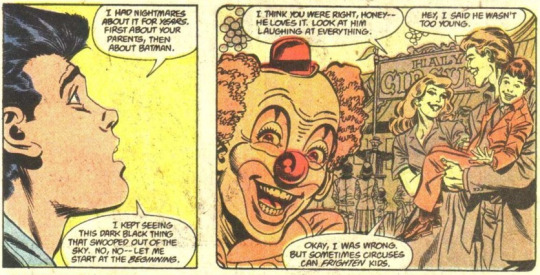


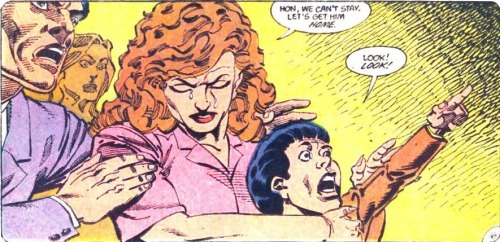
When Janet was first introduced she was depicted as a gentle but “modern” woman. This was written in 1989, told by a 13 year old Tim, so this theoretically was meant to take place in 1979. I’m not here to give a lecture on the history of sex discrimination in the united states, but much of the legislation protecting women in the workforce or surrounding women’s bodily autonomy would have been very very new in this initial depiction.
Here, Janet is shown to be encouraging, emotional, maternal, and projects her own feelings onto Tim. Jack is shown to be slightly sexist, possibly discouraging, but not overbearing. And the artist is shown not to know how to draw children.
To insert some speculation, I think it’s important to note all the Drakes witnessed a terrible murder/accident that day. I point this out, because this is the last time Jack and Janet are depicted this way. It’s possible they changed as a result of this event specifically.
However, this is also a story being told by Tim. It’s also possible these events aren’t really “real” at all, and Tim is misremembering what his parents were like as a three-year-old, possibly projecting a more palatable version of his parents into the narrative. This is entirely up to personal interpretation.
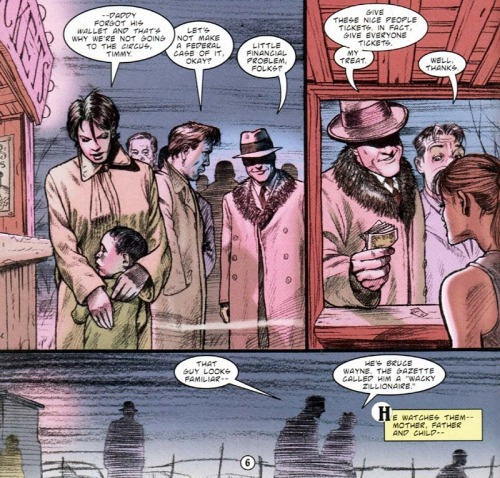
In fact, the Drakes are shown in Legend of the Dark Knight attending Haly’s Circus, and the artist knows what a toddler looks like and they’re depicted as already having a slightly strained relationship. Jack is clearly on the defensive, and Janet seems to be passive-aggressive, though she could just be attempting to explain the situation to her toddler honestly. The intended tone isn’t especially clear.
I do want to point out, in this depiction, Tim isn’t being carried like he was in the previous one. He’s walking ahead of his parents, which isn’t a terrible horrible crime, but could be dangerous in a crowded place like the circus. Might be a subtle hint to his parents overall neglect.
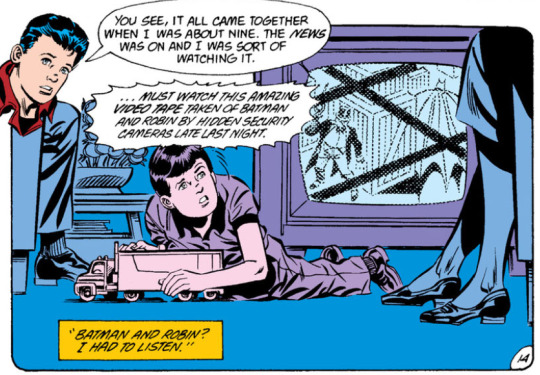
Back to A Lonely Place of Dying, in Tim’s memories of the night he discovered Robin and Dick Grayson were the same person at nine-years-old, his parents are home, and watching TV together while Tim played... trucks, idk, in the living room with them. (This is semi-interesting, because you could say “oh, Tim liked vehicle toys as a kid” or you could extrapolate that this is another subtle indication of Jack’s sexism, providing Tim with appropriately “boy toys.” Either interpretation is valid. If Tim was assigned female at birth, would they have been given “girl toys,” or allowed to play with whatever they wanted?)
This is, to my knowledge, the only panel of the Drakes when Tim is between ages 3 and 13. They’re all together, which might indicate that the Drakes were home more often when Tim was 9, only later going on business trips when Tim was “old enough” but...
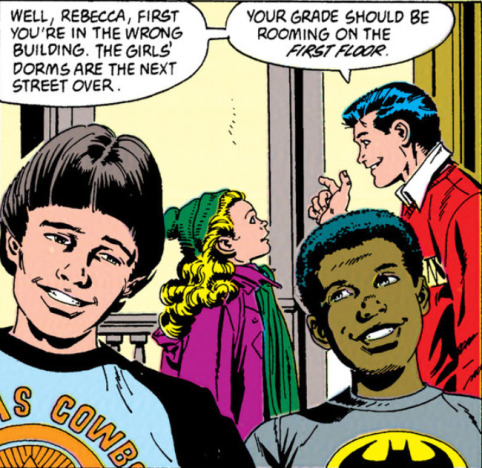
This is Tim’s boarding school when he’s 13. While most boarding schools in the US are for grades 9-12, Tim is clearly not a freshman at age 13; look how much younger the other kids in this panel are. In the US, the youngest you can attend most boarding schools is 7.
That means Tim could have begun going to boarding school anytime between 7 and 13. He most likely spent all of middle school in boarding school, at least. There are an almost infinite number of possible ways the Drakes handled having a business that required lots of international travel, an archeology hobby, AND a very young child. Janet staying home until Tim was 7, 11, 13, is equally possible as the Drakes having a nanny until 7, 11, 13. Tim just doesn’t talk about that period of his life very much.
(”What about Mrs. Mac?” - it is unclear when Mrs. Mac begins working for the Drakes. We only see her when Jack comes out of his coma. She could either be a long standing staff member, or a recent hire.)
Note: I’ve seen it said that it’s canon that “According to Tim, when his parents were home, they made a point to try and include him in their activities, bringing him along to events that were normally adults only.” I have never seen this panel, or I don’t remember it, so I cannot confirm, but I also cannot debunk this because... comics.


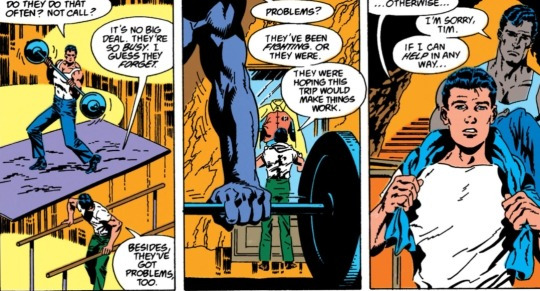


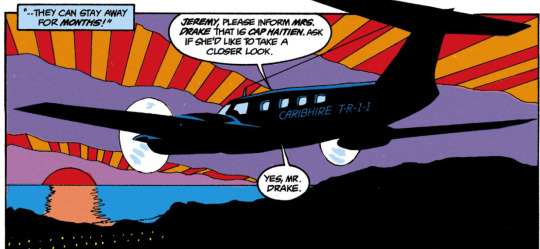
By the time Tim is 13, Jack and Janet are away on business trips a lot, with limited communication, and no firm return date. If I’m feeling generous, I’d say it was harder to communicate internationally in 1990 than it is today. If I’m not feeling generous, I’d say the Drakes are extremely wealthy, and international communication was easier than ever before in the 80s and 90s. They’re not even going home to see Tim in a week or two, they’re going home and calling Tim at boarding school in a week or two.
Even Bruce thinks its weird, though he doesn’t say so to Tim’s face. It’s written almost as if Tim’s parents’ neglect was meant to be a plot point that just got forgotten about.

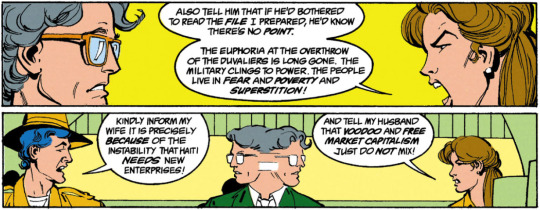

Tim’s parents are fighting at this point (their poor assistant), but Janet still goes with Jack on these business trips. And she’s clearly involved in the business, somehow, but the comics never SAY what Janet’s JOB is. We’re told Jack is the exec, but Janet is ONLY ever referred to as Jack’s wife, though they’re later described as the “heads” of the company, plural.
Just to be clear, this is Jack’s business. There’s a perception that Jack is a bad business man because he and Janet fight over company decisions, and Jack looses the business after Janet dies, but Jack looses the company YEARS after Janet dies, and maintains it for about a year after No Man’s Land at that. We’re not told how Jack looses the business, but he’s got to be doing something right. Janet isn’t necessarily the “real brains” of Drake Industries.
And I’m not... gonna... touch the... exploitation and racism because... I’m not qualified to do that. But, here’s the panel. The Drakes sure seem exploitative and racist in their business decisions. Someone else can... analyze that with more nuance.
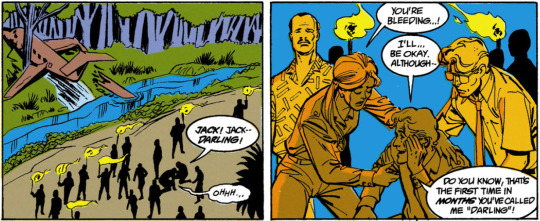
Regardless how how long they’ve been fighting, when their lives are in danger, the Drakes fall back into a loving husband and wife. Their marriage may be falling apart, but they do care about each other.
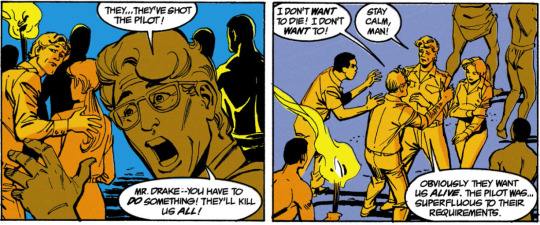

I want to show these panels because it shows that Tim and Jack do have things in common. They’re both level headed in a crisis and can be somewhat cold in their practicality. Janet meanwhile and silent. Jack is later willing rant and rave at their captors, but Janet remains silent.
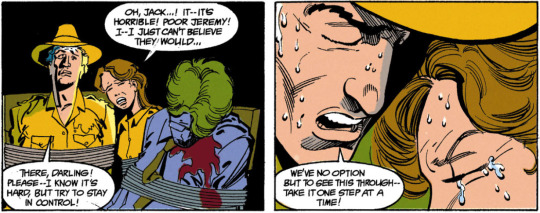
That is, until they’re alone, and she finally lets herself fall apart.
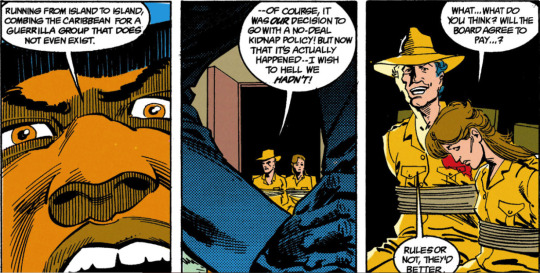

God, Jack can be obnoxious. Janet just looks miserable and resigned. I actually think Tim takes after his parents in this respect in equal measure. Tim can have a temper, but he can also be fairly melancholy and defeatist.
Jack keeps reminding Janet to be strong and in control, which could be period typical sexism? But Jack seems so practiced and ready with the words of encouragement, and with Tim’s history with depression, I wonder if Janet has an inclination towards it as well.
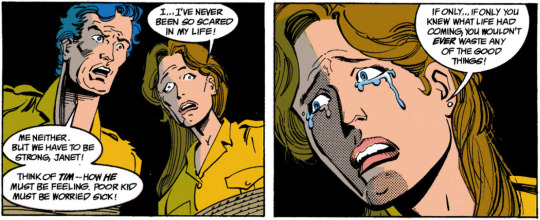
As the end approaches, when Jack brings up Tim, Janet seems to have a lot of regret. She talks about “wasting” the good things, and I don’t think it’s too big of a stretch to assume she’s talking about time spent with her only child.
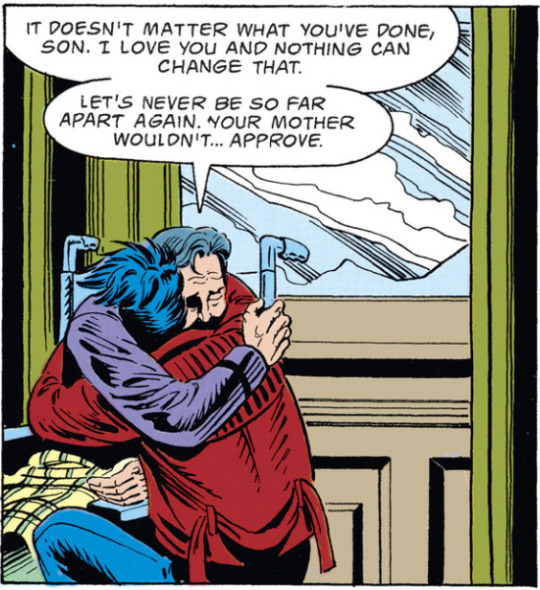
From this point on, Janet is at times spoken of, but not seen. Like here, when Jack says Janet wouldn’t approve of him and Tim being so “far apart.” He says this after he tells him he takes back his threat to send him back to boarding school, which might imply Janet was against the idea of boarding school? Though she obviously lost that argument when she was alive.
Jack will of course renege on this later, but that’s Jack Drake for you.

Or here in Tim’s illness induced dream, where he gets everything he wants. Though, since this is a fantasy of Tim’s, where his father and girlfriend are both more accepting and understanding than they are in real life, I would take this depiction of Janet with a grain of salt.
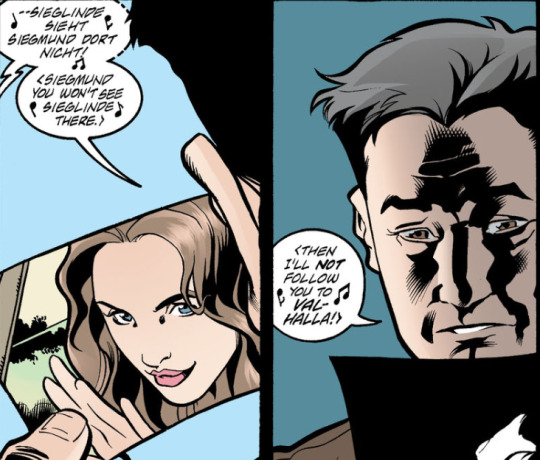
After loosing Drake Industries, Jack thinks about Janet (though, they call her Catherine/Cathy for some fucking reason) during his depressive episode. And... uh...
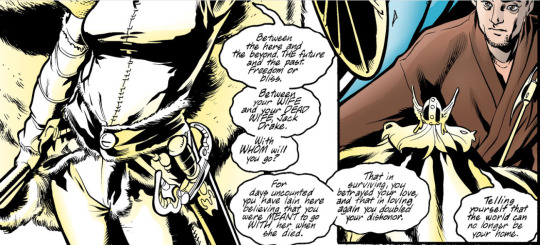
Hallucinates a Valkyrie???? Is this symbolic of suicidal thoughts, or is she... real? Or is he seriously hallucinating?
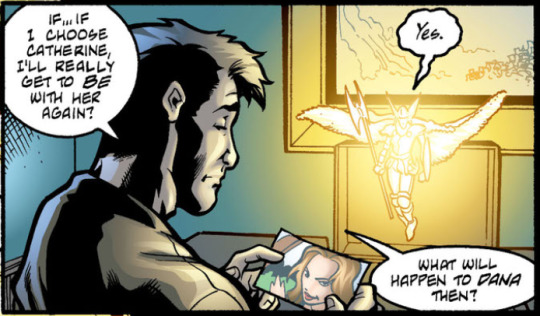
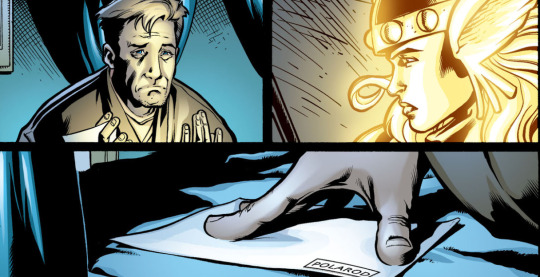
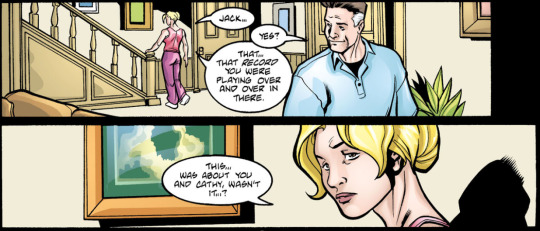
Anyway, we’re not here to discuss Jack’s mental state, the fact that he forgot Tim’s birthday, or that concerning “I was going to knock some sense into you but you’re still bigger than me” statement from Tim, we’re here to talk about Janet. And even though this entire arc is about Jack mourning his first wife, they don’t SAY anything about Janet herself at all. I mean, they don’t even get her name right, so I guess what was I expecting.
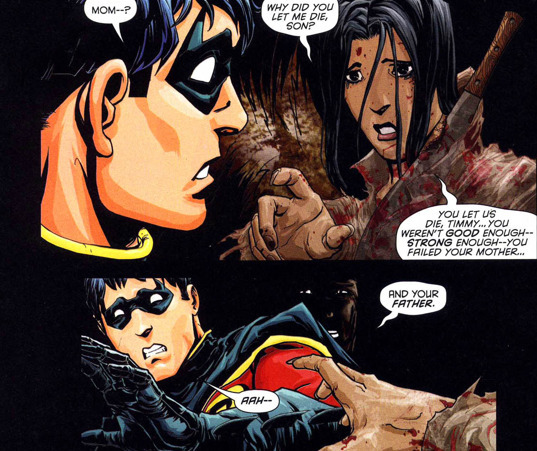
Then there’s Origins and Omens, which also doesn’t say anything about Janet, except that Tim’s memory of her is faulty - Janet was poisoned, her assistant Jeremy’s throat was slit on television, but Tim seems to have conflated the death he did see with the death he didn’t.
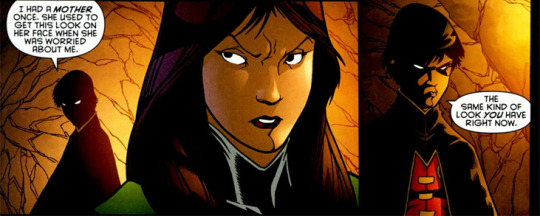
The only piece of canon to suggest that Janet might be cold, is Tim compares her to Thalia. And even then, he’s really just saying Janet was protective of him. It’s kind of a scary look to make at your kid, but Bruce does the same thing, so.
I do want to say... it’s not 100% clear if Tim is even talking about Janet. He could be talking about Dana. Dana was observably protective of Tim, though I don’t think he’s ever called her mom. He PROBABLY means Janet.
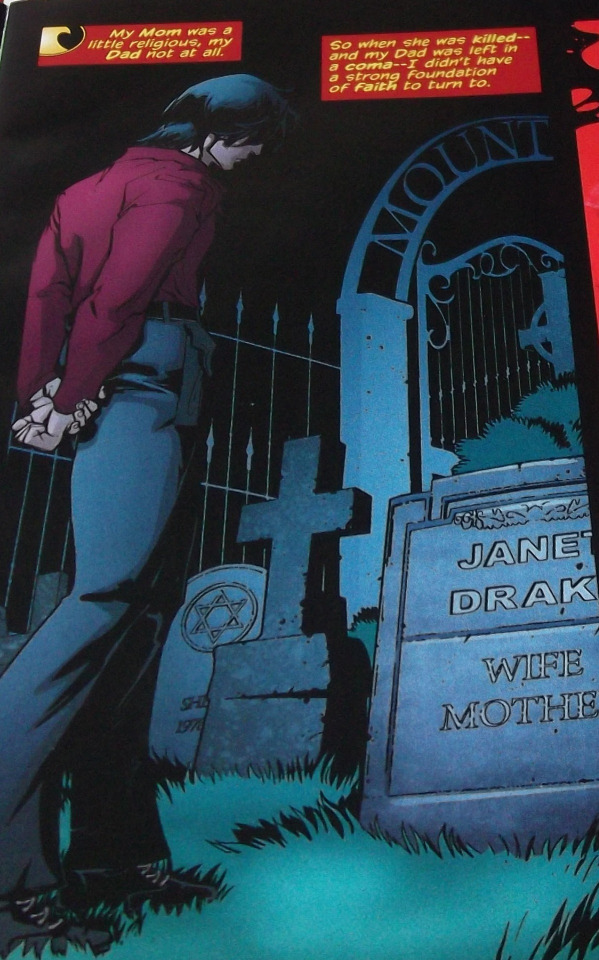
And finally we have Tim visiting his mother’s grave (in a duel Christian/Jewish cemetery, make of that what you will), where Tim says she was “a little religious.”
And that’s it! That is all we know about Janet Drake in New Earth. Hardly the Mom From Hell, but she isn’t perfect. I’d be interested in seeing some alternate depictions of her within the fandom.
I’m still gonna eat up Terrible Parents From Hell like a starving puppy dog, though. Just some food for creative thought.
1K notes
·
View notes
Text
Abused kids are often not aware of or have trouble regulating their own emotions but tend to, conversely, be hyper aware of and tapped into the emotions of others. This is a survival mechanism in people who grow up with an abusive parent, because any sudden changes in the mood of the parent could indicate danger. See the scenes of Zuko when he is with Ozai, particularly in "The Awakening" and in the flashback to the war meeting in "The Phoenix King," when Zuko carefully measures his responses to his father's praise, because even accepting praise is dangerous and could be a trap.

Although Zuko is often oblivious in social interactions, he actually shows a pretty keen insight when it comes to mediating and understanding what the others need once he joins the gaang. He figures out that the loss of his firebending is connected to his change of coat, he helps Aang overcome his fear of fire at the same time he overcomes his own mental blocks with regard to his element, and he realizes that Sokka will go on a foolhardy mission to rescue his father no matter how much Zuko warns him that it's dangerous, so he resolves to go with him. Particularly in "The Southern Raiders" he pretty astutely figures out that the source of Katara's anger was her unresolved feelings about her mother's murder, and knew how to help her. He also shows keen insight into what Katara needs. Aang, though he means well, responds to Katara with moralizing that just makes her angrier and more determined to go her own way. Zuko offers her the means and lets her lead the way, and defends her to Aang after Katara had made it clear she did not agree with Aang. Zuko, in fact, gets angry at Aang on Katara's behalf, and interestingly, Katara, the person who regularly told off anyone who ever said a bad word to Aang and who, a few episodes ago, threatened to kill Zuko himself if he ever hurt Aang, says nothing in response to Zuko’s sarcastic words to Aang, only thanks Aang for understanding in a tone that implies that she doesn’t think Aang understands at all.
Zuko also seems to be aware of the tension between Katara and Aang at the end of the episode, as he purposefully leaves Katara on Ember Island and goes to speak to Aang himself about what happened when they confronted Yon Rha. This implies not only that Zuko knew Katara needed space to process her feelings, but that he knew that Aang and Katara would need time away from each other after the angry way they parted, and it also implies that Zuko wanted to explain Katara's perspective to Aang, fearing that Aang would misunderstand. Aang actually misunderstands anyway, wrongly assuming that Katara had forgiven Yon Rha, and Katara angrily tells him that she will never forgive her mother's murderer, but does forgive Zuko.
Zuko tells Aang that he was right about Katara, although that is contradicted by what Katara just said and the events of the episode. I know some people theorize that this was a result of a lack of unity in the writing, but I also don't think it's out of character for Zuko to say this, even though he also ultimately disagrees with Aang's stance on violence. Zuko is again playing a mediator role and playing both sides a bit, because the episode positions him between Aang and Katara, but he also leaves Aang with a challenge to his moral absolutism.
So I don't think it's a stretch to assume that in the very next episode, Zuko was also picking up on some tension between Aang and Katara when he sat between them. I'm not sure he knows about Aang's romantic feelings for Katara - although he would when he hears his actor on stage call Katara "the Avatar's girl" and sees Aang nod. But he does seem to pick up on Aang's irritation being about more than just a taken seat, as he responds with unprompted anger. Zuko also takes note of Aang’s increasing anger throughout the play, with a concerned expression on his face.
Remember what I said about abused kids being hypersensitive to the changing moods of others? It might be that, or Zuko might be feeling anxious about his role in the play and feeling like he doesn’t deserve forgiveness, or it might be that Zuko is hyper aware of the conflict between Katara and Aang carried over from the last episode to this one.
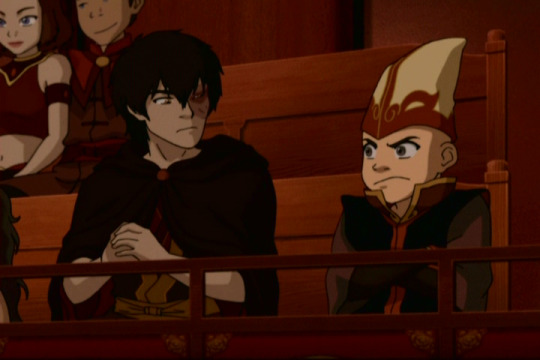
Actually, this shot is particularly interesting because the rest of the gaang is laughing at the portrayal of Toph, including Katara, until Toph shows that she’s pleased by the play’s portrayal of her. Then we see Katara frown, her attention shifting to Aang.

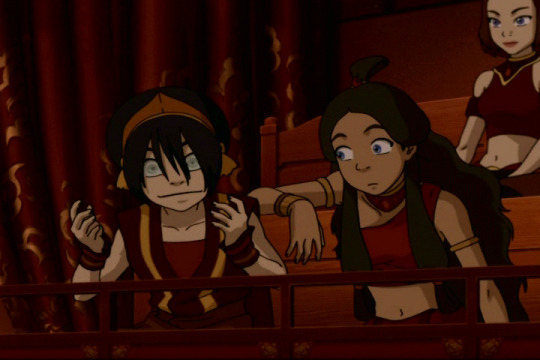


Katara is unhappy that her attempt to get even with Toph backfired, then when she notices Aang as the camera pans to her left, she looks even more unhappy. Then we see the shot above of Zuko looking at Aang with clear concern over the situation. I’m pretty sure that Zuko is aware that something is going on between Katara and Aang at this point. Especially since Aang’s anger at being played by a girl (which is made worse by Toph’s happiness at being played by a boy) is linked to his insecurity about his relationship with Katara, and the play keeps making jokes about it, meant for us to feel sorry for Aang for being put in the “little brother” zone.
I think Zuko was generally anxious going into the play. You can see when they walk in that he has his hood pulled up, to hide his face, because he's aware there's a chance someone will recognize him. So even before the play starts, with its incriminating and humiliating portrayal of him, he is probably already on alert and wants to draw as little attention to himself as possible. Aang's outburst is the kind of thing that would draw attention, and Zuko tries to minimize the attention by insisting that Aang just sit next to him. Zuko also reacts with defensive anger, as he is wont to do when he is anxious or upset, which of course would have the opposite effect from drawing attention away from them. But Aang acquiesces in frustration, and Katara, interestingly, notices the dispute, but just like when Zuko defended her to Aang in "The Southern Raiders," says nothing. Katara also is facing away, fidgety, and looks unhappy while the confrontation is going on. This is also consistent with (and probably contributed to) the way Katara reacts to Aang’s pushiness and accusations later on.
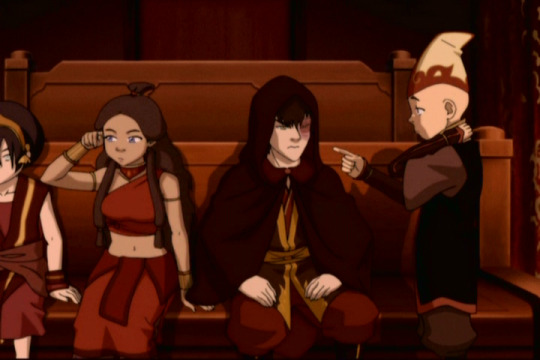
Zuko spends much of the back part of season three physically close to Katara, which is a visual way for the animators to show how close they have grown. It’s not necessarily an indication of romantic Zutara, although there is nothing wrong with interpreting it that way, and I find it hilarious how threatened some people are by shippers gushing over the idea that he wanted to sit next to her, particularly in this episode because this episode actually intentionally plays up the “love triangle” for the purposes of getting the audience to sympathize with Aang and root for him to “get the girl.” Regardless of whether we interpret it in a romantic context, I think it is a good indication of how Zuko feels about Katara once he has gotten her forgiveness. Given Zuko’s social ineptitude, it would make sense that he would be likely to want to stick close to the people he felt closest to, especially in situations where he is surrounded by potentially hostile strangers. Witness his behavior in “The Beach,” where he spent most of the time awkwardly glued to Mai’s side and it was when he was separated from Mai at the party that he ran into trouble with the other partygoers, who make fun of him. That might explain why Zuko, although he comes from the opposite direction when they enter the theater as everyone else does, walks all the way down the end of the aisle to sit next to Katara.
It might also explain why he wants to sit in between Katara and Aang, as these are the two people who he now feels closest to. It also is very likely that he is subconsciously picking up on the tension between Katara and Aang, which comes to a head later in this very episode. It’s worth noting that Zuko is often positioned physically between Katara and Aang throughout this episode, which is meant to communicate to the audience Aang’s anxiety over Katara not returning his feelings (and Zuko plays an indirect part in that, or at least, his stage actor does).
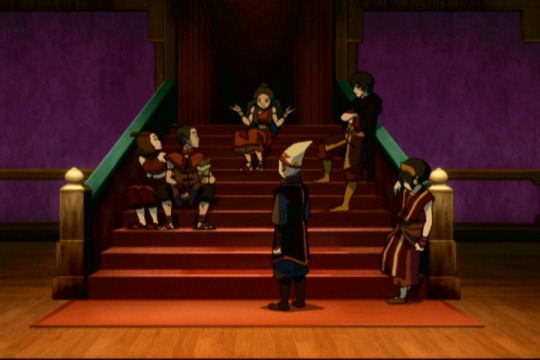
Zuko is also positioned narratively between Aang and Katara as a mediator and comfort to Katara after her fight with Aang in the very next episode, “The Phoenix King,” in which Zuko tells Katara to let Aang figure things out for himself when he runs away after yelling at Katara.
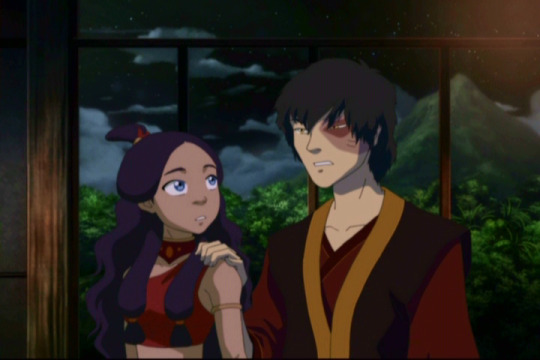
So no, I don’t think the deliberate positioning of Zuko in between Aang and Katara is a coincidence, nor is it “lol Zuko is clueless!” I’m actually very tired of seeing people talk about how clueless Zuko is, especially since a lot of his reactions come from trauma. Even if Zuko didn’t pick up on Aang’s romantic feelings towards Katara he very obviously picks up on and reacts to and interacts with the dynamic between them. And it’s very telling that certain fans will complain about the “infantilization” of Zuko when it’s traits that make him seem sympathetic, but then talk about a traumatized abuse survivor as if they’re completely incompetent.
#zuko#katara#zutara#anti kataang#atla meta#abuse cw#the ember island players#the southern raiders#the phoenix king
854 notes
·
View notes
Note
One thing that's interesting to me about the VC fandom is how people approach the canon take on vampiric sexuality (i.e. that it doesn't really exist). A lot of people retcon the canon approach or find some other way of incorporating actual sex. Do you think an explicit depiction of sexuality adds to the canon or detracts from it? Should we let them bone down or not??
I have quite a bit to say about this because I've thought about it a lot when it comes to my own writing, so thank you for asking!
A brief preface: I debated for a long time whether or not I wanted to include explicit sex scenes in my VC fic. I was very hesitant because, like I've mentioned, I'm a lesbian, so all of this is theoretical for me. I can't really gauge whether what I'm writing would be appealing to someone attracted to men, so I was extremely worried that it would be awkwardly written or deeply unsexy.
But I ended up including it and I did hella research in an effort to do it well (and hopefully I succeeded), so to answer your question, yes. The vampires should bone, and here are the reasons I personally choose to have them do so despite the laborious process and defiance of canon:
Firstly, it's a bit of a middle finger to AR's "genderless" vampires. Her books fall very much into the tropes of desexualizing m/m relationships to make them more palatable to a straight audience, and yet the one real exception to this is the the CP in TVA that also serves to reinforce the stereotype of gay men as predatory. Gay relationships are as complex and three dimensional as their straight counterparts, and I want that reflected in my writing.
Just as important though (at least to me) is the opportunity for character building. There are so many ways to frame sex, so many different tones it can take. What a fantastic avenue for exploring character interactions! It's an extremely intimate and emotionally charged scenario that allows the writer to pause the narrative and explore the nature of the relationship they're writing about. A sex scene is a summative snapshot that's been stretched out over potentially thousands of words for close reading.
I approach writing a sex scene the same way I would an important conversation between the characters. It's really its own form of exchange and focused connection, and there's something very interesting about exploring emotions through physicality rather than words. How can I express what each character is thinking and feeling without much or any dialogue, only the way they interact physically? Touch and body language are such powerful tools, especially in writing where you're almost entirely dependent on what's said or thought to understand characters. Switching that focus to physicality can be very impactful with that juxtaposition.
For Loustat in particular, I think this works very well. Sex scenes are a great way to track how a relationship changes over time and that enemies to lovers arc is so integral to their story. For Lestat, sex showcases his intimacy struggles in a very concise and clear manner. In turn, how Louis approaches sex directly reflects his self acceptance journey.
I also find it to be quite cathartic for both characters when it comes to their personal trauma. Lestat has experienced two attacks that are essentially rapes, extreme violations of his body. Catholic religious trauma has deeply damaged Louis' perception of his own desire/pleasure. Depicting these characters in a healthy sexual relationship goes a long way towards healing these wounds. Lestat reclaims his sexual agency and repairs his relationship with his body. Louis is allowed to finish healing his self image and begin loving the parts of himself he was taught to hate.
(I find this especially important for Louis because while Lestat seems to have fully embraced his attraction to men as a human, Louis very much did not. The idea of his sexuality being essentially erased or "fixed" by vampirism and left forever as unfinished emotional business doesn't sit right with me. I want him to have a chance to deal with those feelings and accept that part of himself.)
I hope that answered your question! I know it was a pretty subjective answer, but that's my thoughts.
35 notes
·
View notes
Text
here's the lowdown on how i feel about the twenty-five twenty-one ending: art should have the grace to not be punitive towards its audience for reading the signs set up by the creator and reading them well. the idea that life is sometimes punitive / youth is fleeting / the times force us into change as an abstract concept belies the fact that these punishments, short of natural catastrophe and illness, are usually the result of decisions and systems that are inflicted upon us by each other. forcing an agenda so ripe with moralism about Adulthood and Time and RealismTM onto a story regardless of its organic development beyond your pen is just not good writing.
why do we write stories? is it to reinforce an idea or is it to create a narrative that demonstrates this idea and does it in a coherent fashion? either way, what is the narrative purpose of mimicking a realism which is itself forcibly wrought? you can say that "life doesn't have to make sense", yes, sure, alright, but fiction does!!!! it really does have to!!!
also, on a personal note, i adored every single microsecond of this show up until the middle of episode 15. thereon out it just felt like the most abjectly didactic narrative, where the tonal shifts did not match the character development. all that love, all that communication, all that perseverance, all of hee-do's commitment to her career, all of it just dissipated with a whimper. i don't really even think its necessary for us, as viewers living through the real horror of covid, which cut short so many lives and so many dreams and relationships and friendships and ambitions and desires, to be so patronizingly reminded that life is transient and fickle and fleeting. i wont even apologize for feeling that bitterness as though we were owed a better story. moralistic fiction is like the most patronizing genre ever. it felt like being back in elementary school with an old teacher who used to tell kids not to cry after making them cry because "real life will not pay attention to you crying". buddy you are the real life! constantly, every single day, we have the choice to make a different decision.
literally, i am not even as mad about baekdo not working out as much as i am about the terribly shallow and dismaying arcs we see the friendships in this drama go through. yes, friendships do dissolve irl, but at the very least they could have done a show instead of doing a tell. time jumps are lazy writing! time jumps are just plain lazy writing! show the dissolution of a relationship by setting up the dissolution for the viewer to experience instead of narrativizing it like a whiplash for no sensible reason. show a friendship trailing away instead of telling it like a bad, cynical story at the funeral of a character no one cares about because no one ever saw him exist. show hee-do's interest in fencing waning instead of just a random conversation with her coach in the old school building! literally everyone died at the end of mr. sunshine but the plot made it all make sense because that's how the story was set up. what we get here, instead, is the viewer being flung out of the tone of the drama almost as though in punishment for having the audacity to believe that a healthy, supportive, communicative love would overcome the ordinary barriers of distance and "the times". if this was going to be a drama about how "the times" broke them apart, like, again, how mr. sunshine went, they shouldve set it up from the start instead of the bulk of the present-day scenes resembling a quasi-reply 1997/1994/1988 plot!
that's it. that's all. i am so done with this particular brand of creators who insist upon reinforcing the fact that life will disappoint you in a perfectly good story that seems to be leading up to the idea that sometimes life also won't. buddy, ok, tell a world living through covid times that life will disapppint us, but you don't have to! they don't even have to end up together!!! but just write a story that makes sense!!!!
13 notes
·
View notes